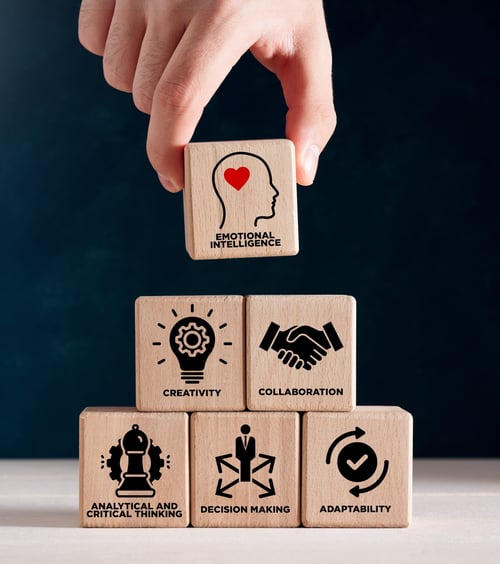As HR leaders everywhere are moving into 2024 and the inevitable changes it will introduce, we don’t need a crystal ball or a fortune teller to reveal the future: We just need data and insight.
Reward Gateway conducts field research throughout the year to track trends and changes in employee engagement, retention and morale, as well as among HR professionals and leaders to gain insight into real activity, challenges and opportunities.
But, as an organisation, we also rely on the experience and knowledge of our leaders and employees alike to ensure that, no matter what, we’re able to look ahead and prepare for the future of the workplace.
 I bring over 15 years of people management experience to my role at Reward Gateway. I’m also a Board Advisor at London HR Connection and the HRD Collective, as well as a frequent speaker on global workforce issues, and I’ve had the pleasure of being recognised by HR Magazine’s Most Influential Practitioner List in 2021 and 2022.
I bring over 15 years of people management experience to my role at Reward Gateway. I’m also a Board Advisor at London HR Connection and the HRD Collective, as well as a frequent speaker on global workforce issues, and I’ve had the pleasure of being recognised by HR Magazine’s Most Influential Practitioner List in 2021 and 2022.
In a two-part blog series, Alexandra Powell (Director of Client Cultural Insights) and I are pleased to share our thoughts about the upcoming year and the trends that HR leaders across Australia should expect to tackle in 2024 (check out our 2024 HR Calendar for more tips and key dates). To read more about Alex’s 2024 predictions, go read her post here.
How do you see wellbeing playing into workplace culture? What are a few ways HR and business leaders can implement into their companies if they want to level up these efforts?
For companies to be successful, employee wellbeing needs to be at the heart of workplace culture. As companies begin to see this as the recipe for success, we’ll see the prioritisation of culture continue across industries next year to drive higher engagement, better retention and improved performance while fostering trust and job satisfaction.
Our recent report, The Australian Talent & Engagement Report, found that:
- 38% are leaving this jobs due to a lack of financial, physical or mental wellbeing support
- 39% view financial, mental and physical wellbeing support as a must-have from a new employer
- 62% state that a manager who cares about their wellbeing is more important than a 10% pay rise, but only one in three Aussie employees (34%) agree that their manager cares
A simple yet effective way HR leaders can implement wellbeing into their companies is to hold activity challenges. These can range from physical challenges – like walking a certain amount of steps everyday – to more holistic practices like hydration or healthy eating habits, which have the added benefit of improving mental health.
Effective communication, flexible work arrangements, comprehensive benefits, employee recognition, leadership support and upholding work-life balance are all strategies that can help companies encourage a wellbeing-centric workplace culture.
 If you had to choose one soft skill to “upgrade” for success in the workplace next year, what would it be, and how would you go about developing it?
If you had to choose one soft skill to “upgrade” for success in the workplace next year, what would it be, and how would you go about developing it?
Without a doubt, emotional intelligence (EQ) is a crucial factor that impacts various aspects in the workplace, such as communication, teamwork, leadership, conflict resolution and overall wellbeing. Employees with higher EQ tend to be more effective communicators and contribute to creating psychologically safe workplaces by leading with empathy. One effective strategy is to set up EQ assessment programs that allow people to understand their own EQ. Following this, implementing a feedback and self-reflection framework that encourages open and honest communication between employees and their managers, fostering a two-way dialogue. By developing EQ, leaders can enhance their self-awareness and recognise the impact they have on others. This enables them to self-regulate their emotions more effectively, making them better equipped to manage challenging situations through empathy and understanding.
How do you think the demand for soft skills will evolve in 2024? What are the specific skills that are likely to be highly valued?
Work is changing faster than ever before, especially with the addition of AI, and both employers and employees have different expectations and priorities. As “soft skills” come in more demand, I anticipate a focus on both adaptability and resilience. Adaptability will be crucial in this ever-changing work landscape. Being adaptable will allow employees to collaborate in this hybrid working environment and pivot where needed by embracing an open mindset.
Resilience is important for keeping up with the times, innovating without the fear of failure and helping individuals and organisations navigate and adapt to change effectively. AI is a great example of this, with discussions around AI potentially taking jobs. That’s not the case, and there will always be the need for human presence. Still, it’s about recognising when and where to leverage AI and adapting its positive impact on the evolving workforce, such as automating processes that allow us to spend more time on human activities.
Will the hiring process change based on this push for softer skills, and even with new tech and AI becoming more widespread?
 The traditional emphasis on hard skills within the hiring process is shifting as new tech and AI advance. With this growing emphasis on soft skills, such as communication, adaptability and collaboration, there’s an increased focus on qualities that are uniquely human and not easily replicated by AI. Over the next year, we can expect to see these hiring processes place a greater emphasis on interpersonal and emotional intelligence skills.
The traditional emphasis on hard skills within the hiring process is shifting as new tech and AI advance. With this growing emphasis on soft skills, such as communication, adaptability and collaboration, there’s an increased focus on qualities that are uniquely human and not easily replicated by AI. Over the next year, we can expect to see these hiring processes place a greater emphasis on interpersonal and emotional intelligence skills.
There are many EQ tests that are free to low cost to help organisations understand a bit more about how people work in teams and where on various spectrums they sit on EQ.
What do you think will be the biggest challenge organisations will face next year when it comes to employee engagement?
Organisations will be faced with three big challenges next year when it comes to employee engagement: employee wellbeing (mental health, burnout and loneliness), employee productivity (embracing AI, flexibility and tangible productivity outcomes), aligning employees with purpose-driven work (as more employees want to work for organisations that align with their personal values) and the diverse needs of the broad generations in the workforce.
Do you anticipate HR leaders adjusting their talent acquisition strategies to prioritise softer or specific skills over traditional qualifications, like college degrees?
 Yes, it is important to incorporate inclusive recruitment practices that provide an equal opportunity for people and ensure that all employees have equal access to opportunities for career advancement. This approach recognises that a diverse range of backgrounds, perspectives and motivations can lead to more innovative and well-rounded teams.
Yes, it is important to incorporate inclusive recruitment practices that provide an equal opportunity for people and ensure that all employees have equal access to opportunities for career advancement. This approach recognises that a diverse range of backgrounds, perspectives and motivations can lead to more innovative and well-rounded teams.
In order to support this inclusive recruiting, we will begin to see HR teams incorporating purpose-based hiring into their recruitment process to identify candidates whose intrinsic motivation, values and soft skills align with business needs. This approach not only helps in finding the right people but also fosters a sense of shared purpose and commitment among employees, ultimately contributing to a positive workplace culture and better outcomes.
Schedule a call with one of our friendly employee engagement experts to learn how Reward Gateway can help to make your corner of the world a better place to work.
 Nebel Crowhurst
Nebel Crowhurst
